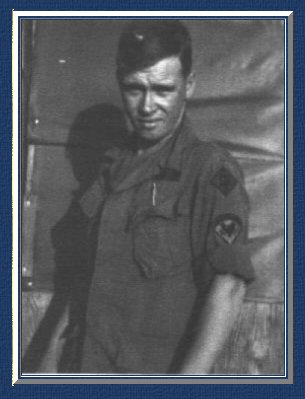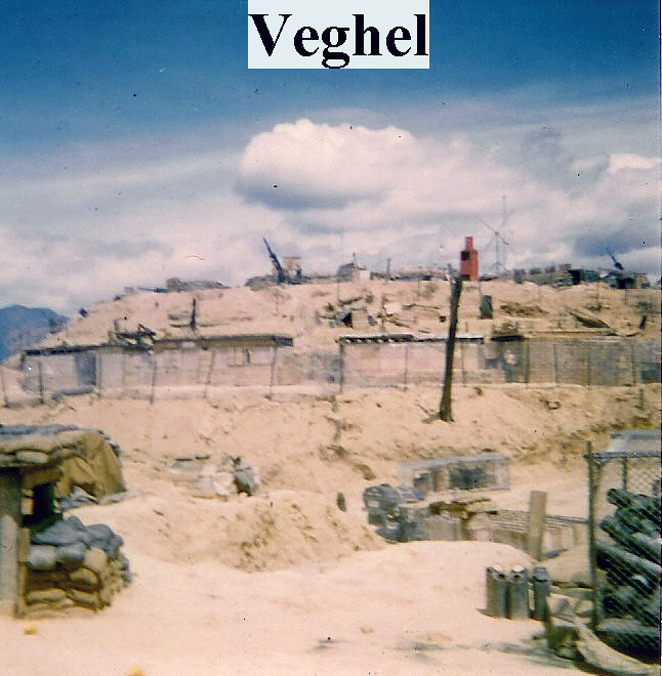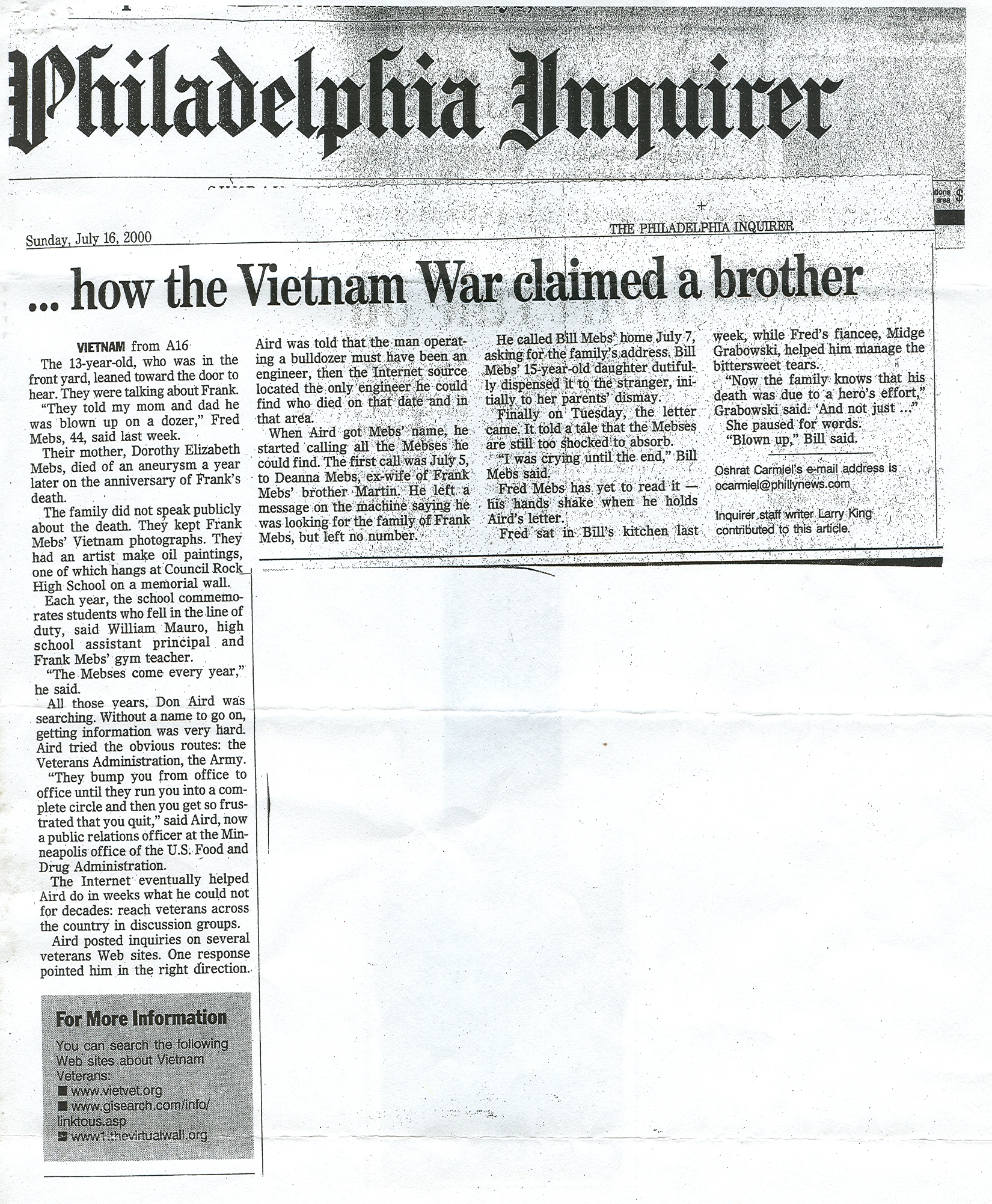A
Tribute to Frank Mebs


For
30 years Bill Mebs avoided talking about his
oldest brother Frank, an Army private who dies
in Vietnam when the bulldozer he was driving
rolled onto an ammunition dump and exploded.
Frank was just two weeks away from going home
to Bucks County and his death was to painful
to remember.
For
the same 30 years, Don Aird just couldn't forget
that explosion. Not the strange boom that awoke
him May 27, 1970, as he slept underneath a truck
at Fire Support Base Veghel. Not the hot orange
flashes he could feel against his face. And
certainly not the sight of bulldozer parts,
wheels, pipes, shards of metal, raining on his
battalion. “I still see the flash with my eyes
closed," he said, "It's still coming
back," I say "Here's that ammo dump
again."
Aird
didn't know Francis Martin Mebs, the 20 year
old man on the bulldozer. But he believed that
man had thwarted a fire that could have blown
away the 600 men stationed on that hill near
Hue. And he wanted so desperately to tell that
man's family. Tuesday, he did.
That
day, Bill Mebs got a letter from Aird saying
that the brother he lost died a hero.
It
was news to Mebs and his six remaining siblings,
who had long presumed that Frank Mebs' death
was just an accident they could not explain.
“I
accepted it," Bill Mebs said of his brother's
death, which was followed a year later by the
death of their grief-stricken mother. "But
I thought it was a waste, because he just got
blown up."
Aird
told the family there was more to Frank Mebs'
death. Mebs, an engineer in Company A of the
27th Engineer Battalion, was helping to contain
the fire, using his bulldozer to push dirt on
the burning heap of ammunition. He gave up his
life, but he saved others, Aird wrote.
"There
were three artillery batteries and a company
of infantry on that hill," he wrote. "I
think that if the dozer hadn't contained the
explosion, one or more of the artillery batteries
would have gone up, maybe even the whole hill."
Fire
Support Base Veghel, like hundreds of others,
was set up as a warehouse of ammunition and
manpower for American forces.

Click
here for information about Fire Support
Base Veghel
Aird
had arrived that week as a member of the First
Battalion of the 83rd Artillery. Already on
the hill were another artillery battalion, a
company of infantry and Frank Mebs' engineering
battalion. Mebs was a bulldozer operator, and
a proud one, his family said. Mebs, who left
Council Rock High School in 1966 to enlist,
wrote home nearly monthly, sending dozens of
photographs of the D-7 dozer that the Army entrusted
to his care.
Fire
support bases were common enemy targets, said
William Donnelly, a historian at the U.S. Army
Center of Military History in Washington. And
around 1 a.m. on May 27, 1970, the infantry
battalion at Veghel suspected that just such
an attack was under way.
Battalion
crews fired two mortar rounds, but did not fire
them with sufficient charge to reach their target,
according to archives of an army investigation
that labeled the incident "friendly fire."
The
rounds instead fell short and ignited an ammunition
dump on the hill.
The
engineering battalion leaped to action, trying
to contain the fire, according to documents
filed at the National Archives. Among them were
Frank Mebs and his bulldozer.
Twenty
minutes after the fire started raging, the shed
exploded, killing Mebs and Sgt Edward M. Miller,
who Aird said was hit by a piece of the bulldozer
debris.
Aird
heard the pieces hit the truck he was under,
and rushed to slide from under it to see what
had happened.
Everyone
around him was talking about the man on the
bulldozer.
The
potential for catastrophe was there. Aird's
artillery battalion alone had enough gunpowder
for 160 rounds for each of four guns. For one
type of gun, a round equaled 90 pounds of powder.
That alone had a "killing radius"
of 120 meters, or about 130 yards, Aird said.
"I
think this guy might have saved our lives,"
Aird, now 56, said last week in a telephone
interview from his Minneapolis home.
The
survivors decided they would find out the man's
name, his rank, and who his family was. But
they got sidetracked by the war, by the Army's
sealed records, and by distance.
The
Mebs family would know few of the details that
Aird would share three decades later.
Fred
Mebs remembers that May day 1970 when two Army
officers walked into the family's home in Newtown
Borough.
The
13 year old, who was in the front yard, leaned
toward the door to hear. They were talking about
Frank.
"They
told my mom and dad he was blown up on a dozer,"
Fred Mebs, 44, said last week.
Their
mother, Dorothy Elizabeth Mebs, died of an aneurysm
a year later on the anniversary of Frank's death.
The
family did not speak publicly about the death.
They kept Frank Mebs' Vietnam photographs. They
had an artist make oil paintings, one of which
hangs at Council Rock High School on a memorial
wall.
Each
year, the school commemorates students who fell
in the line of duty, said William Mauro, high
school assistant principal and Frank Mebs' gym
teacher. "The Mebses come every year,"
he said.
All
those years, Don Aird was searching. Without
a name to go on, getting information was very
hard. Aird tried the obvious routes: The Veterans
Administration, the Army.
"They
bump you from office to office until they run
you into a complete circle and then you get
so frustrated that you quit," said Aird,
now a public relations officer at the Minneapolis
office of the U.S. food and Drug Administration.
The
Internet eventually helped Aird do in weeks
what he could not for decades: reach veterans
across the country in discussion groups.
Aird
posted inquiries on several veterans Web sites.
One response pointed him in the right direction.
Aird
was told that the man operating a bulldozer
must have been an engineer, then the Internet
source located the only engineer he could find
who died on that date and in that area.
When
Aird got Mebs' name, he started calling all
the Mebses he could find. The first call was
July 5, to Deanna Mebs, ex-wife of Frank Mebs'
brother Martin. He left a message on the machine
saying he was looking for the family of Frank
Mebs, but left no number.
He
called Bill Mebs' home July7, asking for the
family's address. Bill Mebs' 15 year old daughter
dutifully dispensed it to the stranger, initially
to her parents' dismay.
Finally
on Tuesday, the letter ame. It told a tale that
the Mebses are still too shocked to absorb.
"I
was crying until the end," Bill Mebs said.
Fred
Mebs has yet to read it, his hands shake when
he holds Aird's letter.
Fred
sat in Bill's kitchen last week, while Fred's
fiancée, Midge Grabowski, helped him
manage the bittersweet tears.
"Now
the family knows that his death was due to a
hero's effort," Grabowski said. "And
not just...." She paused for words. "Blown
up." Bill said.

To view the original
newspaper clippings just click on the pictures
below to enlarge

 


|